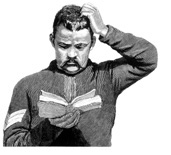
Chesterton on Man, the Religious Animal
VITAL WORKS RECONSIDERED #50
The Everlasting Man. By G.K. Chesterton.
The novelist H.G. Wells showed his disdain for Christianity when he published his popular three-volume Outline of History in 1920. In this thousand-page tome, Wells devoted a mere ten pages to the life and death of Jesus Christ. G.K. Chesterton found himself obliged to remind the world of a contrary view. In 1925, three years after he had been received into the Catholic Church, Chesterton wrote The Everlasting Man. In it, he asserts that Jesus was not merely one of many great figures in history; rather, He is at the center of all history: past, present, and future.
Chesterton describes his thesis thus: “Those who say that Christ stands side by side with similar myths, and his religion side by side with similar religions, are only repeating a very stale formula contradicted by a very striking fact.” That very striking fact is that historians like Wells simply cannot bring themselves to speak objectively about the life and enormous historical importance of Jesus because they do not believe in Him. But it is not so much their disbelief as their hostility that rankles Chesterton. “Their criticism has taken on a curious tone; as of a random and illiterate heckling,” he observes. “They cannot be Christians and they cannot leave off being Anti-Christians. Their whole atmosphere is the atmosphere of a reaction: sulks, perversity, and petty criticism. They still live in the shadow of the faith and have lost the light of the faith…. Why should they be impartial; what is being impartial, when the whole world is at war about whether one thing is a devouring superstition or a divine hope?”
Chesterton asserts the necessity of hearing the whole story from one who believes. In The Everlasting Man, he tells the long story of man before Christ, and the shorter story of man ever since. He talks about how Christ, after dying miserably on a blood-soaked cross, rose up and intersected both halves of human history; not like one of the pale polytheisms of the ancient world, but like a single, white, still shining, and everlasting thunderbolt from the sky.
The first thing Chesterton wants to settle is whether it is true that man evolved ever so gradually into his own nature, or whether he appeared in the course of history as a distinct creature separated from all others by special powers and gifts that are found nowhere else in creation. Apparently, the latter is true. No matter how hard men look, the psychological history of the human race is elusive and entirely speculative.
Science is powerless to detect any moment at which a creature appeared on earth before man and showed signs of having the ability to draw pictures that would hint at a greater and more sophisticated artist yet to evolve, such as the artist who more than 30,000 years ago drew the figures of animals found on the walls of caves in France. Whatever activities occupied the minds of the creatures from whom man is supposed to have evolved, there is no record of a gradual psychological evolution. Indeed, the art of the first men who drew pictures on cavern walls in the bowels of the earth is not substantively different from the art of the cavemen today who spray-paint pictures on the walls of modern subway stations.
You May Also Enjoy
From first to last, The Whimsical Christian provides the unadulterated pleasure of watching the workings of a powerful Christian mind.
When a storyteller has a true love and respect for his young audience, it is evident, and any imparted moral lessons are carefully and charitably communicated.
GKC won not only a popular following but also the respect and admiration — if not always the agreement — of serious intellectual and literary figures of his time.

